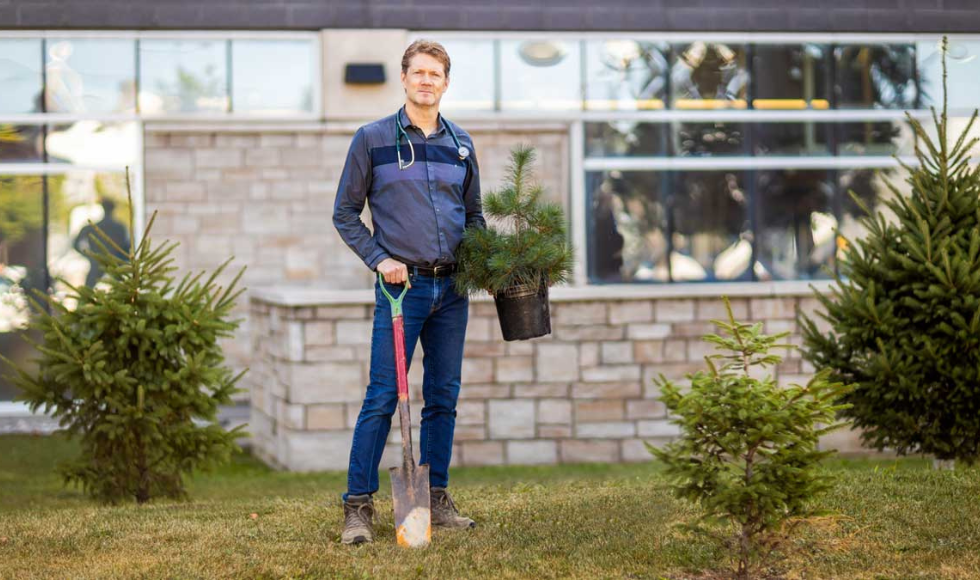Climate change and health care: Myles Sergeant on how individuals and institutions can help

Sergeant, an assistant clinical professor known for his climate advocacy and initiatives, talks about the dangers of climate change, the power of individuals and the health care sector to drive sustainable change, and his hope to save our “frail planet.”
Unseasonably mild winters. Forest fires and smoke. More reports of catastrophic storms. We’ve experienced increasingly extreme weather changes in the past few years, and the intersection between environmental issues and health is a pressing concern.
Myles Sergeant is an assistant clinical professor in McMaster’s Department of Family Medicine who is deeply involved in efforts locally, provincially and nationally to reverse the effects of climate change.
Sergeant is the postgraduate medical education lead for sustainable health care at McMaster, the president of Trees for Hamilton, and the co-founder of PEACH Health Ontario, a provincial initiative to engage, encourage and empower those in the health sector to take climate action at their site. He is also the executive director of the Canadian Coalition for Green Health Care.
We spoke with Sergeant about the dangers of climate change, the power individuals and the health care sector have to make more sustainable choices, and why he hasn’t lost hope to save our “frail planet.”
How would you describe climate change and its harms?
Our weather patterns and temperatures are changing. This is happening primarily because of the process of burning of fossil fuels that we extract from the ground. A recent study showed that 80 per cent of our greenhouse gases are created by just 57 gas, oil, or coal companies across the globe.
This is harmful to human health for many reasons. We are seeing “desertification,” which is the fact that every year our deserts grow by the size of the country of Belgium. This impacts our liveable spaces and the ability to grow food.
We are losing vegetation through fires and temperature changes. We need carbon sinks, like forests, to cool the planet. The increased temperatures impact people with chronic health conditions and those who are vulnerable to heat because of age or poverty.
We are also seeing an increase in climate disasters. For example, Nova Scotia had three climate disasters in a six-month period last year. This impacts people’s housing, finances, and psychological well-being, which can contribute to climate grief.
Recent studies show the health-care sector is responsible for 4.6 per cent of Canada’s total greenhouse gas emissions. What are some of the changes the sector can make?
People are shocked by that number — if you think of all the cars and housing and industry in Canada, you wouldn’t expect health care is that much of a contributor. Health care has a bigger carbon footprint than the airline industry!
The studies are clear — the solutions need to come from within the supply chain. Our sector needs to focus not just on the cost or quality of a product; we need to push our suppliers to be transparent about their carbon footprint, enforce procuring from sustainable suppliers and also make changes to adopt a circular economy.
For years we’ve lived by a linear economy, or what is called the “cradle to grave” economy, where we dig something out of the ground to create it, likely in a distant part of the world, and we ship those materials to a manufacturer to produce the product, then ship it for packaging and after it’s used for a brief period of time, it’s shipped to a dump or incinerator.
In a hospital setting, a one-time-use plastic gown is an example of this process.
The circular economy involves purchasing washable, reusable gowns that are created once and used 80 times. Yes, there is a footprint to washing them, but it does not come close to the 80 gowns you saved. That is one of the changes that we’re making in our sector.
What are some changes we can make at an individual level to contribute to climate solutions?
First, it comes back to the supply chain. Each of us need to start supporting the circular economy, which means buying less and buying used. It means taking your shoes into a cobbler to have them resoled or taking your toaster to be repaired instead of replacing it.
Another important individual piece is to support companies wisely. The companies we buy from are often rated on their carbon, forest, and water footprints. You can find websites that rate these companies — you have power as a consumer to decide not just what you’re going to buy but who you’re going to buy from.
And lastly, there’s an opportunity to move toward plant-rich diets. A plant-rich diet can decrease the risk for diabetes and cardiovascular disease, but also has positive impacts for the environment, such as reducing greenhouse gas emissions. Food waste is also a big problem individually and in the health care sector — and something we should look to address.
It’s easy to feel helpless about climate change. What’s your message to those who feel climate doom and that the solutions are coming too little too late?
There is no question that damage is being done, but I remain optimistic.
I think of it this way: I work with older patients and some of them come to the hospital, and they may not look like they have long to live. But when they get great nursing care, get on the right treatments, they can go back home, and people will live much longer than expected.
I think about the planet the same way: We have this frail planet that we haven’t taken care of, but if we do a 180, who knows what’s possible?


